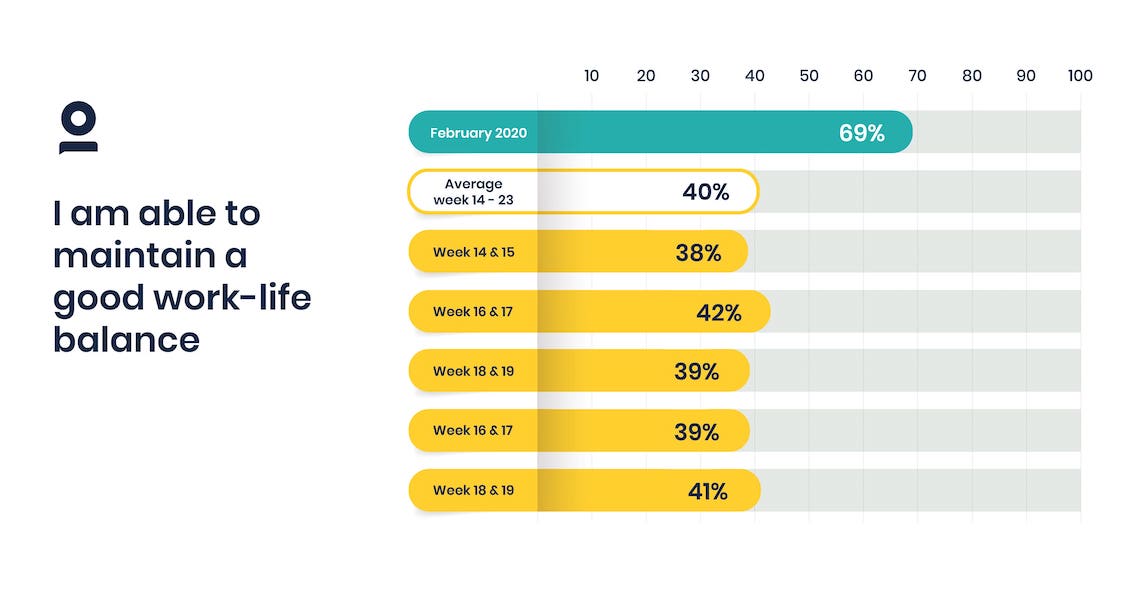The average employee’s concentration is disrupted around two hundred times a day by incoming emails, app notifications, social media updates and phone calls. Responding to each interruption means switching tasks every two minutes. At the end of a day like that, your head is spinning and relaxing is difficult. Despite all your efforts, you also wonder what you actually achieved that day!
Occasionally staring into space isn't that crazy

The four concentration leaks
Psychologist Mark Tigchelaar knows a lot about focus and productivity. He is one of the founders of the Focus Academy. and he believes that there are four major obstacles that stand in the way of focused work.
The first is our own addiction to stimulation, which means it doesn’t take long for us to perceive a task as boring. That’s why we seize every opportunity to avoid having to work. The second focus leak is our own thoughts: tasks you don’t want to forget, emotions that linger or new ideas that pop into your head. Thirdly, we often give our brains far too little rest. We take a break with a fun film clip, instead of gazing into space. We are glued to our screens continuously, rather than moving around. And finally, our working environment also offers far too much stimulation far too often.
Join our upcoming webinar!
Free webinars with Effectory's HRLab series. Sign up and we'll keep you updated on upcoming events.
RegisterFlow is fine
If you want to really be proud of your work, you’ll need to concentrate so that you can focus on a task for longer periods, despite all the distractions that are lurking. If you succeed, you can be creative, get through mountains of work and still barely feel that you are making an effort.
That’s because you’re in a flow, which not only makes you productive, but happy as well. Don’t expect to be able to work at maximum concentration for eight hours a day, five days a week. After a while, your brain’s powers of concentration wane and you have to take time to recover. In order to achieve occasional focus, you need to let your mind wander regularly.
Scrapping instead of stacking
All Effectory employees have been taught at the Focus Academy. Because we have all completed the same focus management training and coaching, we have developed a common language. It’s no longer taboo to say: “I’ll be offline for the next few hours, because I want to concentrate.” Everyone gets that. We also all have roughly the same kind of inbox; in other words, pretty empty.
In addition, it is important as an employer to minimize the amount of external stimulation. That is why employees benefit enormously from clear priorities and from managers who scrap tasks instead of stacking them up. Autonomy is also important. A lack of autonomy creates stress and thus hinders concentration and engagement. And besides that, you want to work on an organizational culture that creates enough freedom for relaxing and being unreachable.
Work and private lives are becoming entwined
The coronavirus crisis is blurring the distinction between work and private life. On the one hand, that’s good because it means we show more of our real, messy and authentic selves. But there is also a danger that people will never leave the office. In addition, digital traffic will only increase now employees are working from home, resulting in even more fragmented attention.
If organizations are not careful, they will reach the end of the second wave only to be swamped by another wave — this time, of burn-outs. During the first wave, just 40% of Dutch employees experienced a positive balance between their work and private lives. This was demonstrated by our pulse measurements taken from over 123,000 European employees. We need to be seen to restore this balance in the fall.
Now you have the opportunity to help create new habits
Now that organizations are figuring out how to handle working in the office and from home, this is also the ideal time to create new habits together. For example, you can decide that nobody will communicate with each other online during certain hours. You can also define focus blocks when everyone can examine things in detail. This will reduce the risk of employees burning out and increase the chance of people finding their flow and enjoying being able to achieve much more.
Engagement in your work
In a series of blogs, Guido Heezen, founder of Effectory, explains the conditions required to create an engaged workforce. Engagement is the extent to which employees are absorbed in their work. Engaged employees learn quickly and are creative. Engagement is a good predictor for customer satisfaction, low employee turnover, high productivity and profitability.
Book a free demo. See our solutions in action.
Effectory is Europe's Leading provider of Employee Listening Solutions. Schedule a product demo and discover how to enhance your employees' engagement.
Demo request

